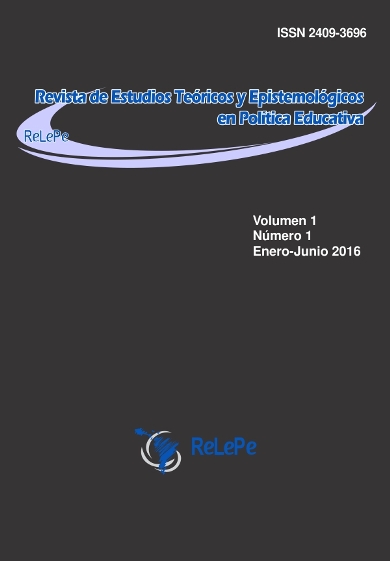Epistemological approaches and the ontological resolution in educational policy
Abstract
Abstract: The article proposes a way to address epistemological issues in education policy research through an epistemological script that describes the conditions under which epistemic questions in the context of educational policy make sense. A historical reconstruction of the philosophical context of the emergence of the question about the scientific nature of knowledge is exposed, describing the sociological turn on the epistemic justification of knowledge, in favor of a perspective that privileges the context of discovery (socio-cultural) over the context of justification (logic). We focus on the scientificity of educational policy knowledge, aiming at re-discovering the fundamental epistemic demands in ontological terms, which allows to make explicit the basic thesis of work: the nature of the epistemological problems in education policy depends on specifying the object of its study. We finally refer to the convergence between theoretical issues and their practical implications.
Keywords: Educational Policy. Epistemic dilemmas. Science and Society.
Downloads
Metrics
References
Ball, S. J. (2008). The education debate. London: The Policy Press.
Ball, S. J. (2006). Education policy and social class: The selected works of Stehphen J. Ball. London: Routledge.
Bronfrenner, U. (1987). La ecología del desarrollo humano. Madrid: Paidós.
Donoso, S. (2013). El derecho a educación en Chile: Nueva ciudadanía tras el ocaso neoliberal. Santiago de Chile: Bravo y Allende.
Grayling, A. C. (1996). “Epistemology”. En: Bunnin, N. y Tsui-James, E. P. (Comps.). The Blackwell companion to philosophy. Oxford: Blackwell.
Jiménez, A., Jiménez, J. y Palmero, C. (2006). “Política educativa y la naturaleza compleja de la educación: Nuevos enfoques epistemológicos”. Revista Española de Pedagogía, v. 64, n. 234, pp. 249 -272.
Kotzee, B. (2011). “Education and ‘thick’ epistemology”. Educational Theory, v. 61, n. 5, pp. 549 -564.
Kuhn, T. S. (1990). La estructura de las revoluciones científicas. México DF: Fondo de Cultura Económica.
Platón (1989-1999). Obras Completas. Vol. 5. Madrid: Gredos.
Putnam, H. (1996). “La objetividad y la distinción ciencia–ética”. En: Sen, A. y Nussbaum, M. C. (Comps.). Calidad de Vida. México DF: Fondo de Cultura Económica.
Putnam, H. (1988). Razón, verdad e historia. Madrid: Tecnos.
Putnam, H. (1991). El significado y las ciencias morales. México DF: UNAM.
Putnam, H. y Putnam, R. A. (1994). “Education for democracy”. En: Putnam, H. (Comp.). Words and life. London: Harvard University Press.
Putnam, H. y Walsh, V. (2009). “Entanglement throughout economic science: The end of a separate welfare economics”. Review of Political Economy, v. 21, n. 2, pp. 291–297.
Quine, W.V.O. (1962). Desde un punto de vista lógico. Barcelona: Ariel.
Quine, W.V.O. (2001). Acerca del conocimiento científico y otros dogmas. Madrid: Tecnos.
Rawls, J. (1971). Teoría de la justicia. México, DF: Fondo de Cultura Económica.
Rawls, J. (1986). Justicia como equidad. Madrid: Universitaria Tecnos.
Wittgenstein, L. (1988). Investigaciones filosóficas. México, DF: Instituto de Investigaciones Filosóficas.
Whitty, G. (2006). “Education(al) research and education policy making: Is conflict inevitable?”. British Educational Research Journal, v. 32, n. 2, pp. 159–176.
Downloads
Published
How to Cite
Issue
Section
License
1. Autores mantém os direitos autorais e concedem à revista o direito de primeira publicação, com o trabalho simultaneamente licenciado sob a Licença Creative Commons Atribuição 4.0 Internacional que permite o compartilhamentodo trabalho com reconhecimento da autoria e publicação inicial nesta revista.2. Autores têm autorização para assumir contratos adicionais separadamente, para distribuição não-exclusiva da versão do trabalho publicada nesta revista (ex.: publicar em repositório institucional ou como capítulo de livro), com reconhecimento de autoria e publicação inicial nesta revista.
3. Autores têm permissão e são estimulados a publicar e distribuir seu trabalho online (ex.: em repositórios institucionais ou na sua página pessoal) a qualquer ponto antes ou durante o processo editorial, já que isso pode gerar alterações produtivas, bem como aumentar o impacto e a citação do trabalho publicado (Veja O Efeito do Acesso Livre).
__________
Los autores que publican en esta revista están de acuerdo con los siguientes términos:
1. Los autores conservan los derechos de autor y garantizan a la revista el derecho de ser la primera publicación del trabajo al igual que licenciado bajo una licencia de Creative Commons Reconocimiento 4.0 Internacional que permite a otros compartir el trabajo con un reconocimiento de la autoría del trabajo y la publicación inicial en esta revista.
2. Los autores pueden establecer por separado acuerdos adicionales para la distribución no exclusiva de la versión de la obra publicada en la revista (por ejemplo, situarlo en un repositorio institucional o publicarlo en un libro), con un reconocimiento de su publicación inicial en esta revista.
3. Se permite y se anima a los autores a difundir sus trabajos electrónicamente (por ejemplo, en repositorios institucionales o en su propio sitio web) antes y durante el proceso de envío, ya que puede dar lugar a intercambios productivos, así como a una citación más temprana y mayor de los trabajos publicados (Véase The Effect of Open Access) (en inglés).
__________
If the article is accepted for publication, copyright of this article will be vested in the The Journal of Theoretical and Epistemological Studies on Education Policy.

Este obra está licenciado com uma Licença Creative Commons Atribuição 4.0 Internacional.

This work is licensed under a Creative Commons Attribution 4.0 International License.

Este obra está bajo una licencia de Creative Commons Reconocimiento 4.0 Internacional.





